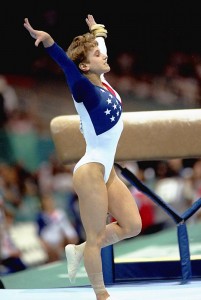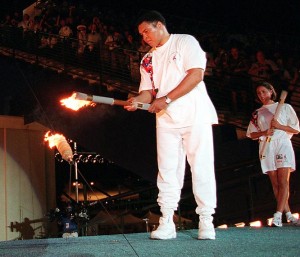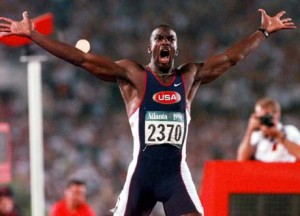A Look Back at the 1996 Summer Olympics
Atlanta was a surprise selection to host the Centennial Olympic Games in the summer of 1996, as many observers believed that the Games should be held in Athens, Greece since the inaugural games were held there in 1896.
But thanks to lobbying from former Atlanta mayor Andrew Young, Atlanta was chosen to host the Centennial Games on September 18, 1990.
Nearly six years later, the city hosted the opening ceremonies in front of 85, 000 fans at Centennial Olympic Stadium (now Turner Field).
The ceremonies ended in dramatic fashion with 1960 Olympic Gold Medalist Muhammad Ali, lighting the Olympic Torch, signifying the start of the Games.
Ali would receive a replacement gold medal for the one he lost, at halftime of the men’s basketball gold medal game.
As far as the competition was concerned, the Americans were expected to dominate the medal count as this would be the first Olympics with the former countries of the Soviet Union participating as individual countries.
The individual with the highest expectations entering these Olympics was U.S. sprinter Michael Johnson, who was trying to become the first man to win the 200-meter and 400-meter races in the same Olympiad.
Johnson had performed this feat at the 1995 Track & Field World Championships, and one month earlier, he broke the world record in the 200 m with a time of 19.66 seconds.
Wearing golden shoes, Johnson won the 400 m with an Olympic record time of 43.49 seconds, and then won the 200 m with by shattering his own world record, running that race in a remarkable 19.32 seconds.
It was redemption for Johnson who had entered the 1992 Olympics as the favorite to win the 200 meters, but failed to qualify for the final heat.
Johnson was not the only U.S. Olympian to pull off a historic feat in Atlanta as U.S. swimmer Amy Van Dyken became the first woman to win four gold medals at the same Olympiad.
Van Dyken won two individual races, the 50m freestyle and the 100m butterfly, and was part of the 4 x 100 meter freestyle relay and the 4 x 100 meter medley relay in earning her four gold medals.
Van Dyken’s performance came in a banner Olympics for American woman, as the woman’s basketball, softball, soccer, and gymnastics teams all won gold medals.
The most memorable gold-medal winning performance came courtesy of the gymnastics team and Kerri Strug.
Heading into the final rotation, the U.S. held a 0.897 point lead on Russia and barring an epic collapse, would win their first gold medal in the team event of woman’s gymnastics.
But after sloppy landings by the first four gymnasts and Dominique Moceau’s falls on both of her attempts, the U.S. were vulnerable and needed a strong vault from Kerri Strug.
But Strug fell on her first attempt, earning only a 9.162 but worst of all, injuring her ankle.
Not certain if her score could hold up, Strug decided to go for the second attempt despite the pain in her ankle, which turned out to be two torn ligaments.
Strug ignored the pain and ran the down the 75-foot runway, then leapt into a back handspring, and landed perfectly on her feet for a 9.732, clinching the gold medal.
Following the event, Strug was carried to the podium by coach Bela Karolyi and joined her teammates to receive their gold medals.

Despite severely injuring her ankle, Kerri Strug landed the vault that won the gold medal for the U.S. women's gymnastics team.
One of Strug’s teammates on that gold-medal winning team was Shannon Miller, who won five medals at the 1992 Olympics but none of them gold.
Miller would add an individual gold medal in the balance beam to close out her Olympic career as the most decorated gymnast in U.S. history.
Other Americans performing in their final Olympics were swimmer Janet Evans who failed to win a medal in Atlanta, and Jackie Joyner-Kersee who took home a bronze medal in the long jump despite a pulled hamstring that caused her to withdraw her from the heptathlon.
But perhaps the best swan song came from 35-year-old Carl Lewis, who took him his fourth straight gold medal in the long jump, earning him his ninth career Olympic gold medal, tying him for most gold medals all-time.
Other notable moments in the Atlanta Olympics included Canadian sprinter Donovan Bailey running a then-world record 9.84 seconds in the 100 meters, Dan O’ Brien winning the gold medal in the men’s decathlon after failing to qualify in 1992, Andre Agassi and Lindsey Davenport winning gold medals in tennis, and the Men’s Basketball team, or “Dream Team II” easily winning the gold medal.
Despite all these great moments, these Olympics did include tragedy when a bomb went off in Centennial Olympic park, killing one person and injuring 110 others.
However, the Games continued without any cancellation or postponement of events and the Park was opened three days after the tragedy.
It was proof that once again the spirit of the Olympics is stronger than the competition of the events.



I beloved up to you’ll obtain carried out right here. The cartoon is attractive, your authored subject matter stylish. however, you command get got an edginess over that you would like be turning in the following. ill indubitably come more formerly once more as precisely the similar just about a lot frequently inside of case you defend this hike.
Seems better
I really appreciate this post. I have been looking everywhere for this! Thank goodness I found it on Bing. You have made my day! Thanks again!
Youre so cool! I dont suppose Ive read something like this before. So nice to search out somebody with some authentic thoughts on this subject. realy thank you for beginning this up. this website is something that is needed on the web, someone with slightly originality. helpful job for bringing something new to the internet!
Olympic games getting more and more interest from the people in the world. Each and every young person want to become an Olympic champion. Not only this every people are getting in the name of games in the physical and technological platform. Especially in those games who have more challengable levels, for example, Minecraft for Android. This is a logical game that has mind boosting levels in it.
Attractive component to content. I simply stumbled upon your web site and in accession capital to claim that I acquire actually enjoyed account your weblog posts. Anyway I will be subscribing on your feeds and even I achievement you get admission to persistently quickly.
Oh my goodness! an amazing article dude. Thank you However I am experiencing issue with ur rss . DonÂ’t know why Unable to subscribe to it. Is there anyone getting identical rss problem? Anyone who knows kindly respond. Thnkx
It’s actually a great and useful piece of info. I am satisfied that you simply shared this helpful info with us. Please stay us up to date like this. Thanks for sharing.
Your Article about A Look Back at the 1996 Summer Olympics | Sports Then and Now Real fantastic visual appeal on this site, I’d rate it 10 10.
I agree with your A Look Back at the 1996 Summer Olympics | Sports Then and Now, excellent post.
I have been exploring for a bit for any high quality articles or blog posts in this sort of area . Exploring in Yahoo I eventually stumbled upon this web site. Studying this information So i?m satisfied to convey that I’ve an incredibly good uncanny feeling I came upon exactly what I needed. I most no doubt will make sure to do not forget this web site and provides it a glance on a constant basis.
jjmnhzp
hey there! , Is fantastic publishing extremely a great deal! percentage most people communicate additional around your current post for Google? I require a pro on this place to solve my own problem. Possibly which is people! Looking toward expert a person.. PC
thanks admin for sharing such a cool post
Nice and wonderful post.
Superb posting really knowledgeable posting great admin keep it up
Nice sharing.
Wonderful and really cool post
Amazing post.
Cool post.
Great job.
Best job.
atlanta marketin ghttps://usacompanylists.com/internet-marketing-service/atlanta-digital-marketing-agency-atlanta-ga/